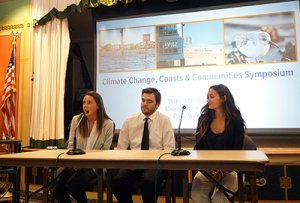 A new issue of the Sea Grant Law & Policy Journal is dedicated to the discussions from the Climate Change, Coasts & Communities Symposium, held at Monmouth University in April of 2019.
A new issue of the Sea Grant Law & Policy Journal is dedicated to the discussions from the Climate Change, Coasts & Communities Symposium, held at Monmouth University in April of 2019.
The event assembled leading experts from around the world in the areas of climate change adaptation law and science. The symposium was organized by Rechnitz Family/Urban Coast Institute Endowed Chair in Marine and Environmental Law and Policy Randall Abate, who wrote the issue’s introduction.
“With its location just a mile from the ocean, the Monmouth campus offered an ideal setting for a robust discussion of the ‘new normal’ of increased storm events, flooding, sea level rise, and coastal erosion due to climate change and how New Jersey can prepare for the daunting climate adaptation challenges that it faces in the years ahead,” Abate said.
The special symposium issue of the journal contains articles from three of the speakers on pressing climate change adaptation challenges in various contexts. In her article, “Warming Oceans, Coastal Diseases, and Climate Change Public Health Adaptation,” Professor Robin Craig of the University of Utah S.J. Quinney College of Law addresses how a public health-focused, disease risk approach can provide an effective focus for immediate coastal adaptation efforts by addressing real human needs and identifying practical “no regrets” first steps that can advance more general climate adaptation efforts.
Transitioning from U.S.-based to Australia-based coastal climate adaptation challenges, Professor Jan McDonald addresses coastal adaptation planning in her article, “Girt by Sea: Antipodean Lessons in Coastal Adaptation Law.” She observes that there has been significant progress in Australia with precautionary planning and adaptive decision-making. Although entrenched interests continue to favor coastal development and protection of vulnerable property, she notes that these special interests appear to be loosening their grip on coastal adaptation policy.
Finally, in his article, “Envisioning Nature’s Right to a Stable Climate System,” Grant Wilson, Esq., executive director and directing attorney of the Earth Law Center, offers an introduction to rights of nature principles and their potential to help address climate change. He first notes emerging climate change threats and underscores the failure of international law to adequately address climate change. He then argues that the rights of nature movement can serve as a useful tool to address climate change, such as by giving nature a voice at climate change negotiations.
Speaker videos, presentations, bios and other event materials can be found at https://www.monmouth.edu/climate-coasts-communities/. The symposium was hosted by the UCI and Monmouth University’s Wayne D. McMurray School of Humanities and Social Sciences, School of Science, Office of the Provost, Global Education Office, Department of Political Science and Sociology, and Youth Activists Group.
